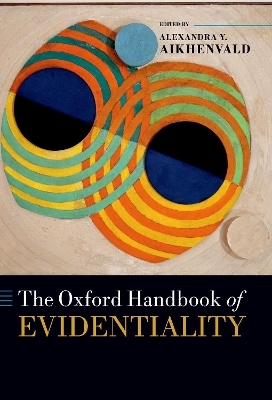
The Oxford Handbook of Evidentiality
Oxford University Press (Verlag)
978-0-19-890101-3 (ISBN)
The Oxford Handbook of Evidentiality offers a thorough, systematic, and crosslinguistic account of evidentiality, the linguistic encoding of the source of information on which a statement is based. In some languages, the speaker always has to specify this source - for example whether they saw the event, heard it, inferred it based on visual evidence or common sense, or was told about it by someone else. While not all languages have obligatory marking of this type, every language has ways of referring to information source and associated epistemological meanings. The continuum of epistemological expressions covers a range of devices from the lexical means in familiar European languages and in many languages of Aboriginal Australia to the highly grammaticalized systems in Amazonia or North America. In this handbook, experts from a variety of fields explore topics such as the relationship between evidentials and epistemic modality, contact-induced changes in evidential systems, the acquisition of evidentials, and formal semantic theories of evidentiality. The Oxford Handbook of Evidentiality also contains detailed case studies of evidentiality in language families across the world, including Algonquian, Korean, Nakh-Dagestanian, Nambikwara, Turkic, Uralic, and Uto-Aztecan.
Aikhenvald is a major authority on languages of the Arawak family, from northern Amazonia, and has written grammars of Bare (1995) and Warekena (1998), plus A Grammar of Tariana, from Northwest Amazonia (CUP, 2003), and The Manambu language of East Sepik, Papua New Guinea (OUP, 2008) in addition to essays on various typological and areal topics, and numerous edited volumes. Her other major publications include Evidentiality (OUP, 2004), Imperatives and Commands (OUP, 2010), Languages of the Amazon (OUP, 2012), The Art of Grammar (OUP, 2014), How gender shapes the world (OUP, 2016), Serial verbs (OUP, 2018), The web of knowledge: evidentiality at the cross-roads (Brill, 2021), I saw the dog: how language works (Profile Books, 2021), and A guide to gender and classifiers (OUP, forthcoming).
1: Alexandra Y. Aikhenvald: Evidentiality: The framework
Part I: Evidentiality: Its Expression, Scope, and History
2: Jackson T.-S. Sun: Evidentials and person
3: Diana Forker: Evidentiality and its relations with other verbal categories
4: Björn Wiemer: Evidentials and epistemic modality
5: Guillaume Jacques: Non-propositional evidentiality
6: Victor Friedman: Where do evidentials come from?
7: Alexandra Y. Aikhenvald: Evidentiality and language contact
Part II: Evidentials in Cognition, Communication, and Society
8: Ercenür Ünal and Anna Papafragou: Evidentials, information sources, and cognition
9: Stanka Fitneva: The acquisition of evidentiality
10: Janis Nuckolls: The interactional and cultural pragmatics of evidentiality in Pastaza Quichua
11: Rosaleen Howard: Evidence and evidentiality in Quechua narrative discourse
12: Michael Wood: Stereotypes and evidentiality
Part III: Evidentiality and Information Sources: Further Issues and Approaches
13: Kasper Boye: Evidentiality: The notion and the term
14: Mario Squartini: Extragrammatical expression of information source
15: Margaret Speas: Evidentiality and formal semantic theories
Part IV: Evidentiality across the World
16: Eithne B. Carlin: Evidentiality and the Cariban languages
17: David Eberhard: Evidentiality in Nambikwara languages
18: Kristine Stenzel and Elsa Gomez-Imbert: Evidentiality in Tukanoan languages
19: Katarzyna I. Wojtylak: Evidentiality in Bora and Witotoan languages
20: Tim Thornes: Evidentiality in the Uto-Aztecan languages
21: Marie-Odile Junker, Conor M. Quinn, and J. Randolph Valentine: Evidentiality in Algonquian
22: Tyler Peterson: Evidentiality and epistemic modality in Gitksan
23: Diana Forker: Evidentiality in Nakh-Daghestanian languages
24: Lars Johanson: Turkic indirectivity
25: Elena Skribnik and Petar Kehayov: Evidentials in Uralic languages
26: Benjamin Brosig and Elena Skribnik: Evidentiality in Mongolic
27: Scott DeLancey: Evidentiality in Tibetic
28: Gwendolyn Hyslop: Evidentiality in Bodic languages
29: Anne Storch: Evidentiality and the expression of knowledge: An African perspective
30: Hannah Sarvasy: Evidentiality in the languages of New Guinea
31: Chia-jung Pan: Evidentiality in Formosan languages
32: Josephine S. Daguman: Reportatives in the languages of the Philippines
33: Ho-min Sohn: Evidentiality in Korean
34: Heiko Narrog and Wenjiang Yang: Evidentiality in Japanese
35: Asier Alcázar: Dizque and other emergent evidential forms in Romance languages
36: Sherman Wilcox and Barbara Shaffer: Evidentiality and information source in signed languages
| Erscheinungsdatum | 10.02.2024 |
|---|---|
| Reihe/Serie | Oxford Handbooks |
| Verlagsort | Oxford |
| Sprache | englisch |
| Maße | 170 x 245 mm |
| Gewicht | 1650 g |
| Themenwelt | Geisteswissenschaften ► Sprach- / Literaturwissenschaft ► Sprachwissenschaft |
| ISBN-10 | 0-19-890101-1 / 0198901011 |
| ISBN-13 | 978-0-19-890101-3 / 9780198901013 |
| Zustand | Neuware |
| Informationen gemäß Produktsicherheitsverordnung (GPSR) | |
| Haben Sie eine Frage zum Produkt? |
aus dem Bereich


